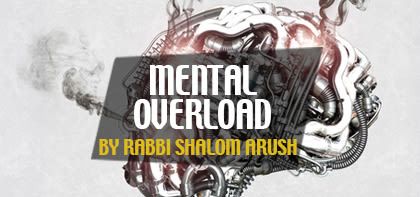
Mental Overload
A person who looks at everything - especially TV and movies - fills his brain with extraneous high-resolution images that predominate it and leave little room for anything else...

Translated by Rabbi Lazer Brody
The temptations of this world are very strong magnets. Unless a person is very careful in guarding his eyes, he almost automatically follows his eyes, pulled along by whatever he sees. And, we’re not only referring to weak-willed people. The Gemara tells us that Samson “followed his eyes” (Tractate Sota 9b). Our sages in turn call the eyes, “panderers of sin,” which pull a person in dangerous directions.
Guarding our eyes is therefore not for men only but for the whole family and a prerequisite for clinging to Hashem and for a wholesome mind. By closing our eyes, we prevent massive amounts of garbage from reaching our brains. Our minds become free to focus on Hashem and on His Torah.
One thinks about whatever he sees. Consequently, one doesn’t ponder what he doesn’t see, for it’s not part of his world. Once we close our eyes to the physical world, we are free to seek the spiritual world – Hashem, His Torah and Divine wisdom. But once we open our eyes in the physical world, our thoughts go everywhere except in the direction of Hashem, unless a person looks at this world as part of his service of Hashem. In other words, he gazes at a beautiful sunset or mountain range in order to praise Hashem.
Since children do not yet suffer from lust, it’s not a good idea to speak to them about forbidden sights. Yet,  we should speak to them about keeping our focus on Hashem, telling them how good it is to cling to Hashem in Torah and in prayer, rather than focusing on all types of things that lack lasting worth. Once again, parental example is most cogent. A father who devotes every free moment to Torah learning, personal prayer and praising Hashem with Psalms will more readily convey the message to his children.
we should speak to them about keeping our focus on Hashem, telling them how good it is to cling to Hashem in Torah and in prayer, rather than focusing on all types of things that lack lasting worth. Once again, parental example is most cogent. A father who devotes every free moment to Torah learning, personal prayer and praising Hashem with Psalms will more readily convey the message to his children.
Random sights not only disorient a person but create needless mental overload. Whatever the eye sees is recorded in the brain. Like a computer, the brain has a given memory capacity. A person who looks at everything – especially TV and movies – fills his brain with extraneous high-resolution images that predominate it and leave little room for anything else. Even if the images are seemingly innocent and harmless, the brain will be cluttered and overloaded, unable to absorb and retain wholesome and holy content.
Rebbe Yaacov Yisroel, the holy “Chozeh of Lublin” of saintly and blessed memory, kept his eyes closed for seven years straight. He saw nothing extraneous, let alone anything damaging. The only things he opened his eyes for were the letters of Torah and the prayerbook. After these seven years, he earned a canny Divine insight, which earned him the title of Chozeh, or seer. His mind’s content was exclusively holy.
A famous saying attributed to the Baal Shem Tov says that a person is where his thoughts are. For example, maybe a person is sitting in a kollel or in yeshiva, but his thoughts are in the outdoor market. That’s where he is, between the greengrocer and the fish-monger, and not learning Torah! On the other hand, if the butcher in the market is thinking about Daf Yomi and what he plans to discuss with Hashem later that day, then he’s with Hashem and not with the sides of beef that he’s cutting up. One is who his thoughts are.
Even if a person is out on the street, if his eyes are closed and he’s focused on Hashem, he’s with Hashem. He shouldn’t care about anything that’s occurring outside his immediate radius, for he’s much safer in his private domain than out in the public domain. By closing his eyes, he remains in the private domain even during the time where he must traverse the public domain. As long as he’s clinging to Hashem, Hashem is with him and he is protected. But when he lifts his eyes and opens them to the surroundings – no longer focused on Hashem but focused on the surroundings – then he is at the mercy of all the lurking dangers, both spiritual and physical.
Without even mentioning the subject of immodest and forbidden sights, any man, woman or youngster – even those who are far from Torah observance – can understand that the brain is influenced by its exposure to the environment. Healthy input is conducive to a healthy mind, and conversely as well, for unhealthy input is devastating to the brain, for it causes unwholesome thoughts. Let’s not forget that a person is the sum of his thoughts.
King David was happy to declare, “And I am always with You” (Psalm 73:23); in other words, he clung to Hashem constantly. He was able to do so because he could also say, “My eyes are always toward Hashem” (ibid, 25:15), for he looked at nothing else unless it was Hashem’s will. The connection is clear – one who guards his eyes is able to cling to Hashem.







Tell us what you think!
Thank you for your comment!
It will be published after approval by the Editor.